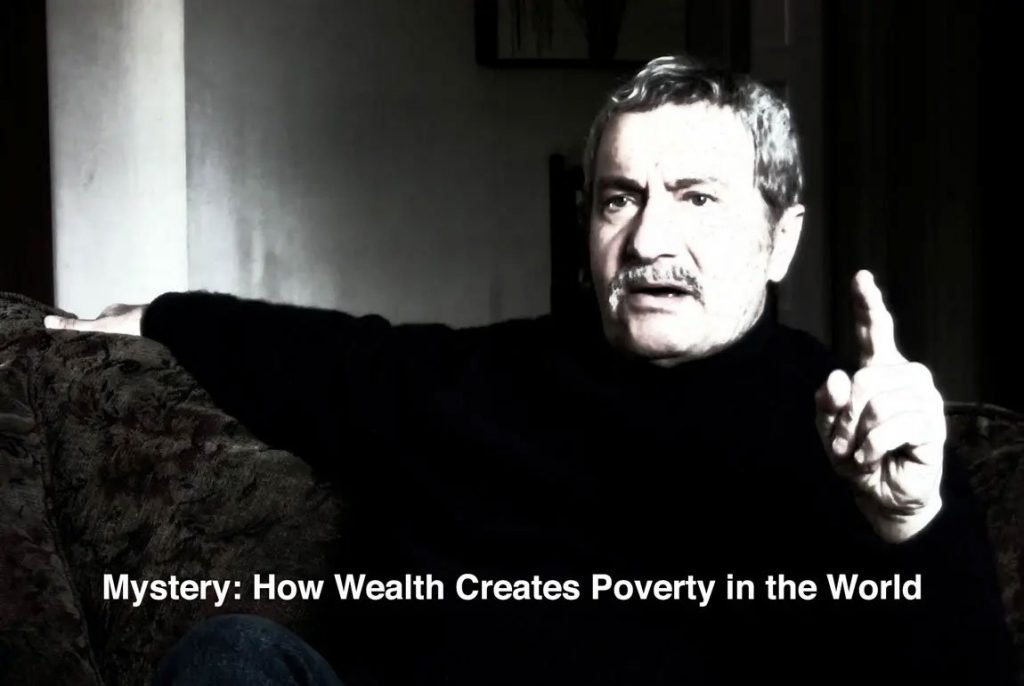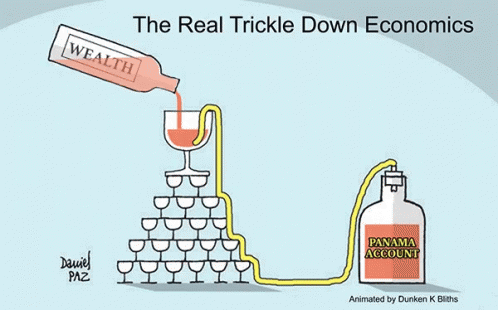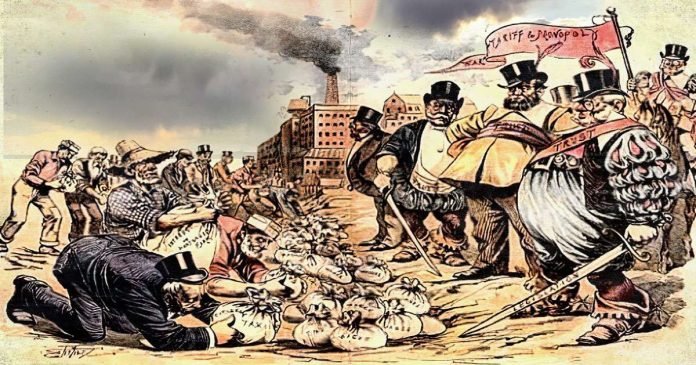Recent history is punctuated with a lot of not-so-great economic “greats” from the Great Depression to the Great Recession. Now we have a new one: When historians look back on the decisions made over the last two years, during the Covid pandemic this period will be remembered as the “Great Consolidation”—the acceleration of a historic wealth transfer and power concentration out of the hands of the people and into those with political power and connections, this is the age of the Oligarchy.
This century we have witnessed the greatest transference of public money into private hands ever seen, and now we are seeing a cost of living crisis, a crisis caused by greed and profit, we understand the truth when its said: “Poverty exists not because we cannot feed the poor, but because we cannot satisfy the rich.” – Anonymous

Michael Parenti explains the mystery of how wealth creates poverty in the world…
Mystery: How Wealth Creates Poverty in the World
There is a “mystery” we must explain: How is it that as corporate investments and foreign aid and international loans to poor countries have increased dramatically throughout the world over the last half century, so has poverty? The number of people living in poverty is growing at a faster rate than the world’s population. What do we make of this?
Over the last half century, U.S. industries and banks (and other western corporations) have invested heavily in those poorer regions of Asia, Africa, and Latin America known as the “Third World.” The transnationals are attracted by the rich natural resources, the high return that comes from low-paid labour, and the nearly complete absence of taxes, environmental regulations, worker benefits, and occupational safety costs.
The U.S. government has subsidised this flight of capital by granting corporations tax concessions on their overseas investments, and even paying some of their relocation expenses—much to the outrage of labour unions here at home who see their jobs evaporating.
The transnationals push out local businesses in the Third World and preempt their markets. American agribusiness cartels, heavily subsidised by U.S. taxpayers, dump surplus products in other countries at below cost and undersell local farmers. As Christopher Cook describes it in his Diet for a Dead Planet, they expropriate the best land in these countries for cash-crop exports, usually monoculture crops requiring large amounts of pesticides, leaving less and less acreage for the hundreds of varieties of organically grown foods that feed the local populations.
By displacing local populations from their lands and robbing them of their self-sufficiency, corporations create overcrowded labour markets of desperate people who are forced into shanty towns to toil for poverty wages (when they can get work), often in violation of the countries’ own minimum wage laws.
In Haiti, for instance, workers are paid 11 cents an hour by corporate giants such as Disney, Walmart, and J.C. Penny. The United States is one of the few countries that has refused to sign an international convention for the abolition of child labour and forced labour. This position stems from the child labour practices of U.S. corporations throughout the Third World and within the United States itself, where children as young as 12 suffer high rates of injuries and fatalities, and are often paid less than the minimum wage.
The savings that big business reaps from cheap labour abroad are not passed on in lower prices to their customers elsewhere. Corporations do not outsource to far-off regions so that U.S. consumers can save money. They outsource in order to increase their margin of profit. In 1990, shoes made by Indonesian children working twelve-hour days for 13 cents an hour, cost only $2.60 but still sold for $100 or more in the United States.
U.S. foreign aid usually works hand in hand with transnational investment. It subsidises construction of the infrastructure needed by corporations in the Third World: ports, highways, and refineries.
The aid given to Third World governments comes with strings attached. It often must be spent on U.S. products, and the recipient nation is required to give investment preferences to U.S. companies, shifting consumption away from home produced commodities and foods in favour of imported ones, creating more dependency, hunger, and debt.
A good chunk of the aid money never sees the light of day, going directly into the personal coffers of sticky-fingered officials in the recipient countries.
Aid (of a sort) also comes from other sources. In 1944, the United Nations created the World Bank and the International Monetary Fund (IMF). Voting power in both organisations is determined by a country’s financial contribution. As the largest “donor,” the United States has a dominant voice, followed by Germany, Japan, France, and Great Britain. The IMF operates in secrecy with a select group of bankers and finance ministry staff drawn mostly from the rich nations.
The World Bank and IMF are supposed to assist nations in their development. What actually happens is another story. A poor country borrows from the World Bank to build up some aspect of its economy. Should it be unable to pay back the heavy interest because of declining export sales or some other reason, it must borrow again, this time from the IMF.
But the IMF imposes a “structural adjustment program” (SAP), requiring debtor countries to grant tax breaks to the transnational corporations, reduce wages, and make no attempt to protect local enterprises from foreign imports and foreign takeovers. The debtor nations are pressured to privatise their economies, selling at scandalously low prices their state-owned mines, railroads, and utilities to private corporations.
They are forced to open their forests to clear-cutting and their lands to strip mining, without regard to the ecological damage done. The debtor nations also must cut back on subsidies for health, education, transportation and food, spending less on their people in order to have more money to meet debt payments. Required to grow cash crops for export earnings, they become even less able to feed their own populations.
So it is that throughout the Third World, real wages have declined, and national debts have soared to the point where debt payments absorb almost all of the poorer countries’ export earnings—which creates further impoverishment as it leaves the debtor country even less able to provide the things its population needs.
Here then we have explained a “mystery.” It is, of course, no mystery at all if you don’t adhere to trickle-down mystification. Why has poverty deepened while foreign aid and loans and investments have grown? Answer: Loans, investments, and most forms of aid are designed not to fight poverty but to augment the wealth of transnational investors at the expense of local populations.
There is no trickle down, only a siphoning up from the toiling many to the moneyed few.

In their perpetual confusion, some liberal critics conclude that foreign aid and IMF and World Bank structural adjustments “do not work”; the end result is less self-sufficiency and more poverty for the recipient nations, they point out. Why then do the rich member states continue to fund the IMF and World Bank? Are their leaders just less intelligent than the critics who keep pointing out to them that their policies are having the opposite effect?
No, it is the critics who are stupid not the western leaders and investors who own so much of the world and enjoy such immense wealth and success. They pursue their aid and foreign loan programs because such programs do work. The question is, work for whom? Cui bono?
The purpose behind their investments, loans, and aid programs is not to uplift the masses in other countries. That is certainly not the business they are in. The purpose is to serve the interests of global capital accumulation, to take over the lands and local economies of Third World peoples, monopolise their markets, depress their wages, indenture their labour with enormous debts, privatise their public service sector, and prevent these nations from emerging as trade competitors by not allowing them a normal development.
In these respects, investments, foreign loans, and structural adjustments work very well indeed.
The real mystery is: why do some people find such an analysis to be so improbable, a “conspiratorial” imagining? Why are they sceptical that U.S. rulers knowingly and deliberately pursue such ruthless policies (suppress wages, rollback environmental protections, eliminate the public sector, cut human services) in the Third World? These rulers are pursuing much the same policies right here in our own country!
Isn’t it time that liberal critics stop thinking that the people who own so much of the world—and want to own it all—are “incompetent” or “misguided” or “failing to see the unintended consequences of their policies”? You are not being very smart when you think your enemies are not as smart as you. They know where their interests lie, and so should we.
Michael Parenti’s recent books include The Assassination of Julius Caesar (New Press), Superpatriotism (City Lights), and The Culture Struggle (Seven Stories Press).
Support Independent Journalism Today
Our unwavering dedication is to provide you with unbiased news, diverse perspectives, and insightful opinions. We're on a mission to ensure that those in positions of power are held accountable for their actions, but we can't do it alone. Labour Heartlands is primarily funded by me, Paul Knaggs, and by the generous contributions of readers like you. Your donations keep us going and help us uphold the principles of independent journalism. Join us in our quest for truth, transparency, and accountability – donate today and be a part of our mission!
Like everyone else, we're facing challenges, and we need your help to stay online and continue providing crucial journalism. Every contribution, no matter how small, goes a long way in helping us thrive. By becoming one of our donors, you become a vital part of our mission to uncover the truth and uphold the values of democracy.
While we maintain our independence from political affiliations, we stand united against corruption, injustice, and the erosion of free speech, truth, and democracy. We believe in the power of accurate information in a democracy, and we consider facts non-negotiable.
Your support, no matter the amount, can make a significant impact. Together, we can make a difference and continue our journey toward a more informed and just society.
Thank you for supporting Labour Heartlands









